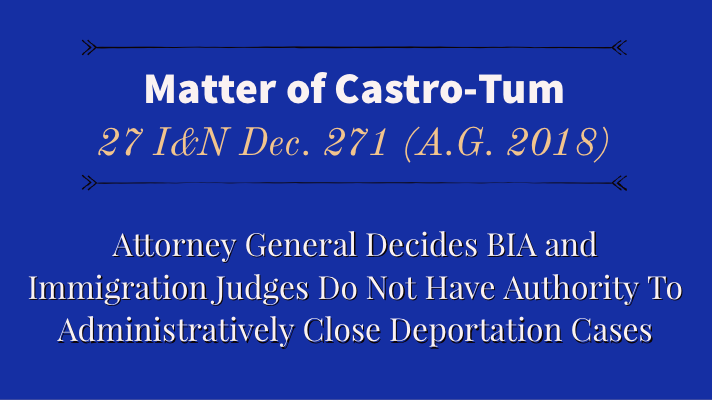
In a disappointing decision by the Attorney General, a decision has been made on whether immigration judges and the Board of Immigration Appeals have discretion to administratively close deportation proceedings. Matter of Castro-Tum, 27 I&N Dec. 271 (A.G. 2018) was decided on May 17th, 2018 after the Attorney General referred the issue to himself.
Why is the Attorney General making this decision?
The Attorney General has the authority to refer Board of Immigration Appeals decisions to himself to review. 8 C.F.R. §1003.1(h)(1)(i). In this case, an Immigration Judge granted several continuances to a juvenile who had been issued a Notice to Appear for deportation proceedings. The Notice to Appear that was handed to the juvenile did not give a date for a hearing. Notice of the hearing was sent to the address provided by the juvenile. When the juvenile didn’t appear for court, the immigration judge continued the case and ultimately administratively closed the case. The government appealed and the Board of Immigration Appeals remanded the case for the Immigration Judge to proceed with the deportation proceedings and to issue an order of removal in absentia if the juvenile did not appear. The Attorney General then referred the decision to himself. The Attorney General’s decision is binding on the Board of Immigration Appeals, which is the appellate court that rules on all appeals from Immigration Judge decisions.
What was the Attorney General deciding?
The Attorney General has the authority to authorize the immigration judges and Board of Immigration Appeals to administratively close proceedings. In this decision, the Attorney General decides whether the Board of Immigration Appeal and/or immigration judges have the authority to administratively close cases and if not, whether to grant that authority or not.
There has been a common practice in the immigration courts for immigration judges and the Board of Immigration Appeals to “administratively close” certain deportation cases. This has helped with a ballooning immigration court backlog that continues to grow ridiculously long. In some cases, an immigration case is set for a final hearing many years after prosecution is initiated. Administrative closure is a tool that allows the courts to triage cases. There is no way that the courts can handle the number of deportation cases before it. The Immigration Courts, often with the consent of the Department of Homeland Security, would administratively close low priority cases.
What does the Attorney General decide?
The Attorney General first decided that there was no legal authority for the Board of Immigration Appeals or immigration judges to administratively close cases. Many argued that this was an implicit power contained in their authority to adjudicate cases. The Attorney General disagreed. The Attorney General held that because there was no statutory or delegated authority specifically authorizing administrative closure, the Board of Immigration Appeals and the immigration judges lack the authority.
The Attorney General also refrained from providing the immigration courts with authority to administratively close cases, citing continuances as a viable alternative.
What is going to happen to cases that were already administratively closed prior to this decision?
The Attorney General ordered that all cases that were administratively closed prior to his decision remain closed unless DHS or the respondent requests recalendaring. Therefore, if DHS requests that an administratively closed case be recalendared, then the case must be recalendared, according to this decision. However, due to the enormous case load that strains the system, it is unlikely that there will be a rapid rush to reopen already administratively closed cases, unless there is some compelling reason, for example, a security issue or criminal issue.
Takeaways
The Attorney General’s decision handcuffs immigration judges, the Board of Immigration Appeals and in many respects, the Department of Homeland Security, by taking away a tool used to relieve some of the pressure on the immigration system, while providing the discretion to administratively close low priority cases otherwise clogging up the immigration system. How will immigration judges react? Will they grant long term continuances? Will they create another vehicle to clear their dockets for higher priority cases? That remains to be seen. What we do know is that this decision will not help an already fully stressed immigration system from being further stressed.
 Jeremy Lasnetski is a partner at the Law Offices of Lasnetski Gihon Law. The firm focuses on criminal defense, immigration and personal injury. Mr. Lasnetski focuses his practice on immigration and criminal defense. Mr. Lasnetski is the former Jacksonville Regional Vice Chair of the American Immigration Lawyer’s Association, Central Florida Chapter and has represented clients in deportation proceedings, USCIS benefit cases, consular processing cases, and more. He routinely gives presentations on immigration law issues to both criminal and immigration lawyers at conferences and seminars throughout the State of Florida.
Jeremy Lasnetski is a partner at the Law Offices of Lasnetski Gihon Law. The firm focuses on criminal defense, immigration and personal injury. Mr. Lasnetski focuses his practice on immigration and criminal defense. Mr. Lasnetski is the former Jacksonville Regional Vice Chair of the American Immigration Lawyer’s Association, Central Florida Chapter and has represented clients in deportation proceedings, USCIS benefit cases, consular processing cases, and more. He routinely gives presentations on immigration law issues to both criminal and immigration lawyers at conferences and seminars throughout the State of Florida.
 Florida Immigration Lawyer Blog
Florida Immigration Lawyer Blog

